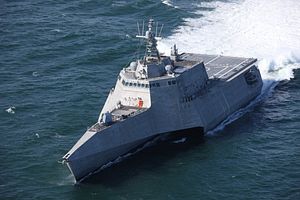The U.S. Navy accepted delivery of its latest Independence-class Littoral Combat Ship (LCS), the future USS Tulsa, in Mobile, Alabama on April 30, the service reports. The new LCS, the 13th littoral combat ship to be delivered to the Navy and the eighth of the Independence variant to join the fleet, is expected to be commissioned in San Francisco in late 2018. As I reported previously, the LCS was christened in February 2017.
LCS are divided into two classes consisting of the Independence and Freedom variants. Independence-class LCS like the future USS Tulsa feature a unique trimaran hull and a larger flight deck, meaning that they can carry two rather than just one helicopter. Independence-class ships also have larger fuel capacity and boast a wider operational range. Freedom-class LCS have a monohull design and are built by Lockheed Martin, while the Independence-class construction is led by Austal USA. Twenty-nine LCS contracts have been awarded to date.
Using an open architecture design, both LCS classes are modular, reconfigurable warships that can be fitted with interchangeable mission packages providing specific capabilities for surface warfare (SUW), anti-submarine warfare (ASW), and mine countermeasures (MCM) missions in the littoral region. The Tulsa will be capable of conducting all three missions sets. According to the U.S. Navy, it “is designed to defeat asymmetric ‘anti-access’ threats such as mines, quiet diesel submarines and fast surface craft.”
Weapons systems aboard the Tulsa include a 11-cell Raytheon RIM-116B SeaRAM missile-defense system, one 57-millimeter naval gun, AGM-114 L Hellfire missiles and Mark 5o torpedoes, next to others. LCS can be armed with additional weapons, depending on the mission packages. The warships were not designed, however, for naval combat as a January 2018 report by the Pentagon’s office of Operational Test and Evaluation notes:
Survivability testing and preliminary analyses on both LCS variants continue to demonstrate that neither LCS variant is survivable in high intensity combat. Although the ships incorporate capabilities to reduce their susceptibility to attack, testing of analogous capabilities in other ship classes demonstrated that such capabilities have limited effectiveness in high intensity combat.
The Department of Defense’s operational testing and evaluation arm assesses that a single hit could put an LCS out of action:
As designed, the LCS lacks redundancy and the vertical and longitudinal separation of vital equipment found in other combatants. These features are required to reduce the likelihood that a single hit will result in loss of propulsion, combat capability, and the ability to control damage and restore system operation.
Furthermore, as I explained in April 2018:
For years there have been doubts whether both LCS variants can fulfill their mission requirements. (The Freedom-class has been particularly accident prone and a number of LCS were put out of action due to technical problems or human error in 2016.) Consequently, next to various LCS upgrades, the U.S. Navy wants to shift from LCS to procuring more capable guided-missile frigates called the FFG(X) beginning in 2020.
Despite efforts to restructure the U.S. Navy’s LCS program, USNI News recently reported due to a combination of factors including extended maintenance periods and additional retrofitting requirements, the Navy may not deploy any of its LCS this year despite previous plans to deploy one to the Middle East and two to Singapore in 2018.
Once commissioned in late 2018, the USS Tulsa will be homeported in San Diego, along with nine other ships of the class. “We look forward to welcoming the future USS Tulsa and crew in San Diego later this year,” said Captain Matthew McGonigle, the commanding officer of LCS Squadron One. ”Bringing a ship to life is no small task and I commend the crew for their hard work and dedication to their ship and to the LCS community.”

































